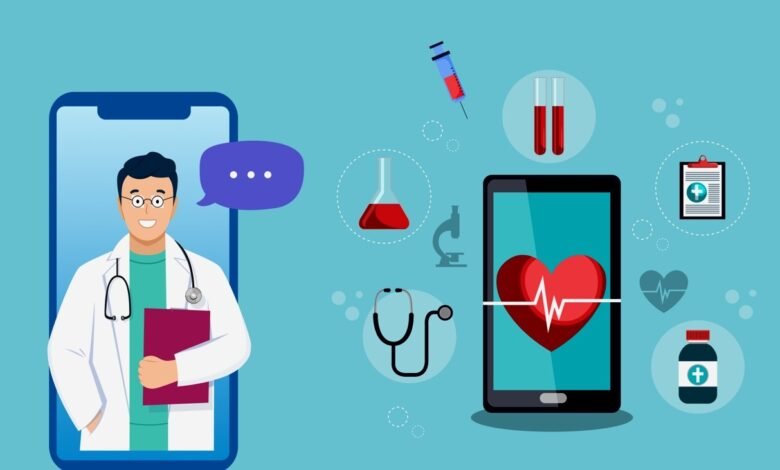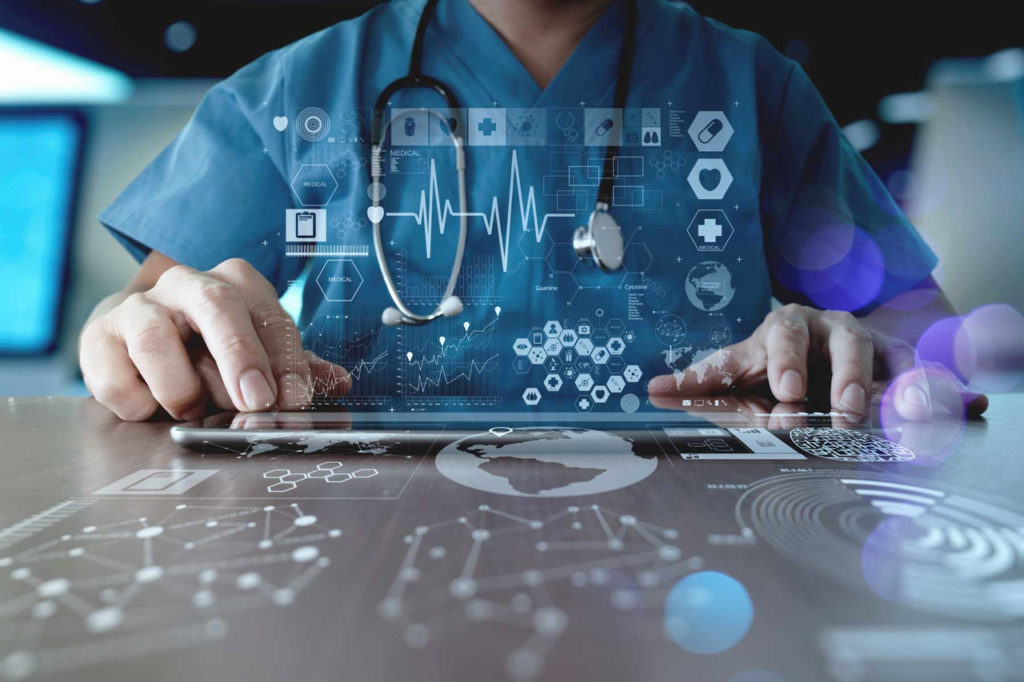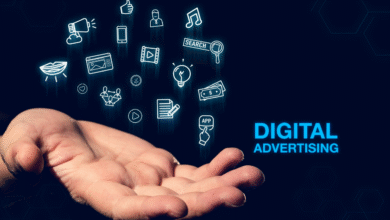
The healthcare landscape in the United Kingdom is rapidly evolving, driven by the integration of cutting-edge technology into medical practices. This transformation is ushering in a new era of healthcare that is more efficient, accessible, and patient-centered than ever before. In this article, we will explore the various ways in which technology is reshaping the future of UK healthcare.
Read More: Find Your Fitness Community in the UK
Telemedicine: A revolution in patient care

The advent of telemedicine has brought about a seismic shift in the way patients receive medical care. With the ability to consult with healthcare professionals remotely, patients now have easier access to medical expertise. This has been especially crucial in a post-pandemic world, where minimizing physical contact is essential.
Benefits of telemedicine
Telemedicine offers a plethora of advantages, including reduced waiting times, cost-effective consultations, and improved access to specialists. Patients can now receive medical guidance from the comfort of their homes, eliminating the need for travel.
Remote monitoring and diagnostics
In addition to consultations, telemedicine enables remote monitoring of patients’ health, providing healthcare providers with real-time data. This allows for early detection of health issues and better management of chronic conditions.
Telemedicine in post-pandemic healthcare
The COVID-19 pandemic has accelerated the adoption of telemedicine, with the NHS embracing digital health solutions to ensure uninterrupted patient care.
Artificial Intelligence in Healthcare
Artificial intelligence (AI) is a game-changer in the field of medicine. AI-powered algorithms can assist in diagnosing diseases, personalizing treatment plans, and even streamlining administrative tasks.
AI-powered diagnosis and treatment
AI’s ability to process vast amounts of medical data and identify patterns makes it a valuable tool for diagnosing diseases and recommending treatment options.
Predictive analytics and preventive healthcare
AI can predict disease outbreaks and help healthcare professionals take preventive measures. It can also assist in identifying high-risk patients and developing personalized prevention plans.
Streamlining administrative tasks
AI can automate administrative tasks, allowing healthcare providers to focus more on patient care. This leads to improved efficiency and reduced administrative costs.
Robotics in Surgery: Precision and Efficiency
Robotic-assisted surgery is redefining precision in the operating room, resulting in better surgical outcomes.
Robotic-assisted surgery
Surgeons can now perform minimally invasive procedures with enhanced precision using robotic systems. This leads to reduced scarring, faster recovery, and improved patient experiences.
Enhancing surgical outcomes
Robotics not only improve precision but also enable remote surgery, making specialized care more accessible to patients across the UK.
Wearable Health Devices: Monitoring health on the go
Wearable devices like smartwatches and fitness trackers have become integral to healthcare, allowing individuals to monitor their health continuously.
Smartwatches and fitness trackers
These devices track vital signs, physical activity, and sleep patterns, providing users with valuable health insights.
Managing chronic conditions
Wearables are particularly beneficial for individuals with chronic conditions, as they can help manage and monitor their health more effectively.
Electronic Health Records (EHRs): Streamlined patient data
Electronic Health Records (EHRs) have revolutionized the way patient data is stored and shared.
Benefits of EHRs
EHRs streamline the sharing of patient data among healthcare providers, reducing the likelihood of errors and ensuring a comprehensive view of a patient’s medical history.
Improving patient safety
EHRs also enhance patient safety by providing instant access to critical medical information, even in emergency situations.
3D Printing in Medicine: Customized solutions
The use of 3D printing in medicine is creating opportunities for personalized healthcare solutions.
Prosthetics and implants
3D printing allows for the creation of custom prosthetics and implants that fit the patient’s unique anatomy perfectly.
Advancements in medical research
In research, 3D printing is enabling the creation of anatomically accurate models for educational purposes and experimentation.
The Internet of Things (IoT) in Healthcare
The Internet of Things (IoT) is connecting healthcare devices to enhance patient care and data collection.
Connecting healthcare devices
IoT devices can communicate with each other and with healthcare providers, facilitating the seamless exchange of information.
Enhancing patient care
Real-time data from IoT devices enables healthcare professionals to make timely decisions and interventions.
Big Data and Healthcare
The healthcare industry is harnessing the power of big data for data-driven decision-making.
Data-driven decision-making
Big data analytics can identify trends and patterns, aiding in research, treatment strategies, and healthcare management.
Improved research and drug development
Big data accelerates research and drug development processes, potentially leading to breakthrough treatments.
Challenges and Concerns
While technology brings many benefits, it also raises concerns, especially regarding data security and ethical considerations.
Data security and privacy
Protecting patient data from cyber threats and ensuring privacy are paramount.
Ethical considerations
The ethical use of AI and technology in healthcare, including issues like bias and transparency, requires careful consideration.
The Role of Government and Regulations
Government bodies like the NHS are crucial in shaping the healthcare technology landscape.
NHS and healthcare technology
The NHS’s adoption of digital health solutions sets an example for healthcare organizations across the UK.
Compliance and patient safety
Regulations ensure the ethical and secure use of technology in healthcare while prioritizing patient safety.
The Impact of Technology on Medical Education
Technology is also transforming the way future healthcare professionals are trained.
E-learning and virtual simulation
E-learning and virtual simulations provide aspiring healthcare professionals with hands-on experience in a controlled environment.
Preparing future healthcare professionals
These technologies prepare students for real-world healthcare scenarios, improving the quality of patient care.
Patient-Centered Care: A Human Touch
While technology plays a vital role, it’s essential to maintain the human aspect of healthcare.
Balancing technology with empathy
Effective healthcare delivery involves combining technological advancements with empathy and compassion.
The importance of the doctor-patient relationship
A strong doctor-patient relationship remains at the heart of quality healthcare.
The Future of UK Healthcare

The future of healthcare in the UK is full of promise, as technology continues to reshape the industry.
Predictions and possibilities
As technology advances, we can anticipate improved patient outcomes, faster diagnoses, and enhanced healthcare accessibility.
The evolving healthcare landscape
The healthcare landscape in the UK is evolving to prioritize patient-centered care, efficiency, and accessibility.
Conclusion
The future of UK healthcare is intricately intertwined with technology, with innovations such as telemedicine, AI, robotics, wearables, and big data driving the transformation. As the healthcare industry continues to embrace these advancements, we can expect a healthcare system that is more efficient, patient-centered, and innovative. While challenges and ethical concerns must be addressed, the future of UK healthcare looks promising, with the ultimate goal of providing high-quality care to all.
Read More: Top 10 Tech Trends in 2023 Everyone Must Be Ready For
FAQs
- How has telemedicine impacted patient access to healthcare in the UK? Telemedicine has significantly improved patient access to healthcare in the UK by providing remote consultations with healthcare professionals. Patients can now receive medical guidance from the comfort of their homes, reducing waiting times and enhancing accessibility.
- What are the key benefits of AI in healthcare? AI in healthcare offers several key benefits, including the ability to assist in disease diagnosis, personalized treatment plans, and the streamlining of administrative tasks. It also plays a role in predictive analytics and preventive healthcare.
- How is 3D printing being used in the medical field in the UK? 3D printing is revolutionizing the medical field in the UK by allowing for the creation of custom prosthetics, implants, and anatomically accurate models for research and education. This technology is enhancing patient care and advancing medical research.
- What role does the NHS play in shaping the future of healthcare technology? The NHS plays a pivotal role in shaping the future of healthcare technology in the UK. It sets an example by adopting digital health solutions, promoting innovation, and ensuring technology is used ethically and in compliance with regulations.
- How can healthcare professionals balance technology with empathy in patient care? Balancing technology with empathy in patient care is essential for healthcare professionals. They can achieve this balance by utilizing technology to enhance efficiency while maintaining a human touch in their interactions with patients. Building and nurturing the doctor-patient relationship remains crucial in providing quality healthcare.








2 Comments